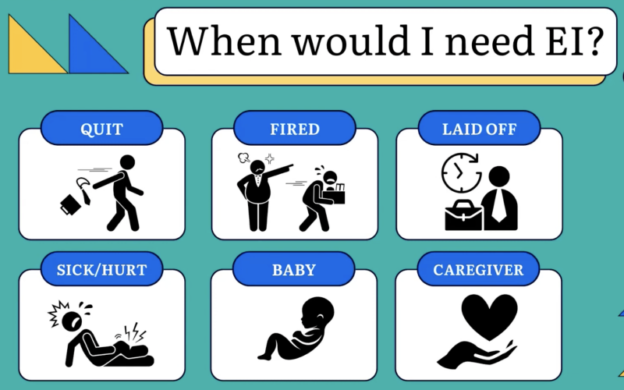The NDP is pushing for changes to the system it says is ‘discriminatory’
This article is sourced from CBC News, written by Natalie Stechyson
What happens to your employment insurance when you lose your job before returning from a maternity or parental leave?
It’s a question often asked in parenting groups, queried on social media or posed to employment lawyers as Canadian parents increasingly find themselves in this situation amid a cooling labour market and mass layoffs in several sectors, such as media and the tech industry.
“I’ve never seen layoffs like this in my life, and I’ve been doing this for 20 years,” Allison Venditti, a human resources expert in Toronto, told CBC News. She’s also the founder of advocacy group Moms at Work, Canada’s largest organization for working mothers, with 7,500 members.
Companies are cutting ranks, Venditti said, and parents who are on leave aren’t immune.
In fact, when companies are laying off employees due to economic issues, they feel more open to laying off those who are on protected leave, said Andrew Monkhouse, managing partner at Toronto employment law firm Monkhouse Law and an adjunct professor at York University’s Osgoode Hall Law School in Toronto.
“It’s a persistent problem in Canada,” he said in an interview.
And that can leave new parents in a financial lurch. Under the current federal employment insurance (EI) system, parents cannot combine unemployment and parental leave benefits. That has critics calling for an overhaul of the system.
On Thursday, New Democrat MP Daniel Blaikie sent a letter urging Employment Minister Randy Boissonnault to change the EI rules immediately, calling the current ones “punitive and discriminatory.”
In his letter to Boissonnault, Blaikie wrote, “Women in Canada have waited long enough for justice in the employment insurance system,” adding, “Just get it done.”
In a statement emailed to CBC News, Boissonnault said the federal government cannot comment on specifics as the issue is currently before the courts.
“Our government will always stand up to give everyone the employment assurance they deserve,” he said.
A huge challenge
Jennifer Extence of Crysler, Ont., was about 10 months into her 18-month maternity leave in January when she said she received notice that she’d been terminated immediately due to restructuring.
Extence, 39, who had been a brand manager, said she contacted Employment and Social Development Canada about two weeks later to provide an update on her situation. Her EI income was immediately stopped, she said, with the explanation that because she would be receiving severance, and severance is considered income, she couldn’t receive EI benefits at the same time.
“It was overwhelming. I never expected to be spending my maternity leave without income,” she said in an interview. “This is time with my children that I’ll never get back, and instead of enjoying every moment, I’m left with the feeling of uncertainty and stress on a daily basis.”
Severance is listed as income on the EI website.
Extence also has to repay the two EI payments she received after losing her job, she said. It’s been “a huge challenge” given the cost of groceries and diapers.
“If I was a single parent or if my partner wasn’t able to float us, I have no idea what I’d be doing to put food on the table.”
Overhauling EI
It’s a common misconception that you can’t lose your job while on maternity or parental leave — because legally you can if you’re being dismissed for reasons unrelated to going on leave.
“It’s always common, but it’s also not illegal,” Venditti said.
A worker who pays into the system has to work a specific number of hours to qualify for benefits and must do so for each new claim they make. That means a new mother who has lost her job and files a claim for regular EI benefits has to work the necessary hours anew to get their full parental leave entitlements.
In 2022, then-employment minister Carla Qualtrough said not being able to stack unemployment and parental leave benefits into one EI claim creates an equity issue in the system, particularly for new mothers. She said she was looking for ways to make the system less clunky to eliminate inequities.
The Liberal government has said it’s committed to modernizing the program. As part of its consultations, Employment and Social Development Canada surveyed Canadians, and 89 per cent of respondents agreed that parents who lose their job “prior to welcoming a child” should be able to access EI benefits for job loss without having any impact on their EI maternity and/or parental benefits.
This kind of overhaul takes time, Venditti said.
The problem is with how the system is structured, Monkhouse said, with maternity leave being part of EI. So if someone is away on maternity leave, they use up that EI allocation, unlike a worker who is laid off generally.
“There’s a disproportionate effect on the people, predominantly women, who are off on maternity leave, in terms of getting EI afterwards,” he said.
Mothers take maternity or parental leave almost twice as often as fathers, according to Statistics Canada.
Job loss on maternity and parental leave is something that’s not really talked about, even though it’s common, Venditti said, adding that one reason may be that parents who pursue legal action often have to sign non-disclosure agreements.
But she said she’s seeing a lot more women, especially in senior positions, being laid off.
“The motherhood penalty is a real thing,” she said. “People always think they’re protected until it happens to them.”
See the original article here: https://www.cbc.ca/news/canada/parental-leave-ei-changes-1.7115993





